PAST EXHIBITIONS
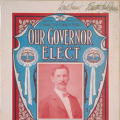
Taking Office: Inaugurations of Virginia's Governors
(October 29, 2001—June 22, 2002)
Taking Office: Inaugurations of Virginia's Governors documents how the gubernatorial inauguration has evolved from a quiet ceremony to a public event.
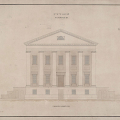
Jefferson and the Capitol of Virginia
(January 7, 2002—June 15, 2002)
Jefferson & The Capitol of Virginia examined how Jefferson, the founder of monumental civic architecture, began his achievements in civic design with the Virginia State Capitol in which he united the lofty principles and grand scale of the Classical tradition with established Virginia customs.
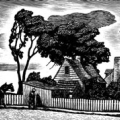
Block. Ink. Paper. The Prints of J.J. Lankes and Charles W. Smith
(June 4, 2001—December 1, 2001)
In the 1930s, New York-born Julius John Lankes and Virginian Charles William Smith both worked in woodcut, an old style of printmaking, and in Virginia. Explore how these two artists created different views of Virginia in the same medium.
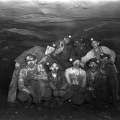
Virginia's Coal Towns
(March 30, 2001—October 27, 2001)
Through images and documents, Virginia's Coal Towns explored the history of coal as a significant part of Virginia's economy, as well as the lives of the miners, who spent so much time underground in dangerous, dirty jobs, and their families.
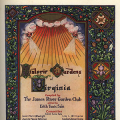
Pleasure in the Garden: A Landscape Exhibit at the Library of Virginia
(December 6, 2000—May 12, 2001)
Pleasure in the Garden explored Virginia's history of gardening. Vegetable garden, flower garden, orchard, kitchen garden, pleasure garden-Virginians tilled and planted a variety of gardens from the beginning of settlement. Gardens not only provided food but also offered pleasing and colorful vistas as well as places for leisure. At the heart of gardening and landscape design was a desire to impose order on the landscape.
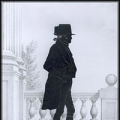
John Marshall
(January 8, 2001—March 31, 2001)
Marking the 200th anniversary of his becoming the fourth chief justice of the U.S. Supreme Court, the exhibition John Marshall highlighted the life of Marshall (1755–1838).
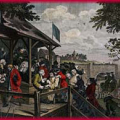
"A full vote, a free ballot, and a fair count": Political Life in Virginia
(January 10, 2000—November 13, 2000)
"A full vote, a free ballot and a fair count" examined key events and issues in Virginia's political history and charted the gradual enlargement of the franchise. Since the founding of Jamestown in 1607, political life in Virginia has undergone many changes that have often involved debates about who could vote and who could not.
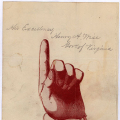
Death or Liberty: Gabriel, Nat Turner, and John Brown
(January 10, 2000—November 8, 2000)
Drawing from the archival collections at the Library, Death or Liberty explored three dramatic events in Virginia that focused America's attention on the problem of slavery: Gabriel's Conspiracy in 1800, Nat Turner's Rebellion in Southampton County in 1831, and John Brown's Raid on Harpers Ferry in 1859. Examine the documents online.
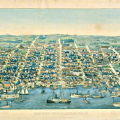
Mapping Virginia
(April 23, 1999—December 15, 1999)
Mapping Virginia offered a sampling of the many kinds of maps created by and for Virginians in the past 400 years. The history of cartography in Virginia reflects the pivotal role of the Old Dominion as a leader in much of the political, military, and economic history of the United States. In a rapidly changing society property ownership, political boundaries, economic resources, and the environment were best understood through the mapmaker's craft. Virginia in Maps, published in 1999 and the basis for the exhibition, is available from the Virginia Shop.
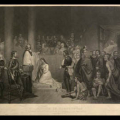
Father and Son: The Works of John Gadsby Chapman and Conrad Wise Chapman
(October 16, 1998—March 22, 1999)
Father and Son: The Works of John Gadsby Chapman and Conrad Wise Chapman presented more than one hundred sketches, watercolors, engravings, and oils by these two Virginia artists for the first time since the 1960s. The exhibition consisted of three sections: John Gadsby Chapman's work as a leading illustrator in the 1830s and 1840s; scenes of Italy and France by both Chapmans; and oils and watercolors of Mexico by Conrad Wise Chapman.


